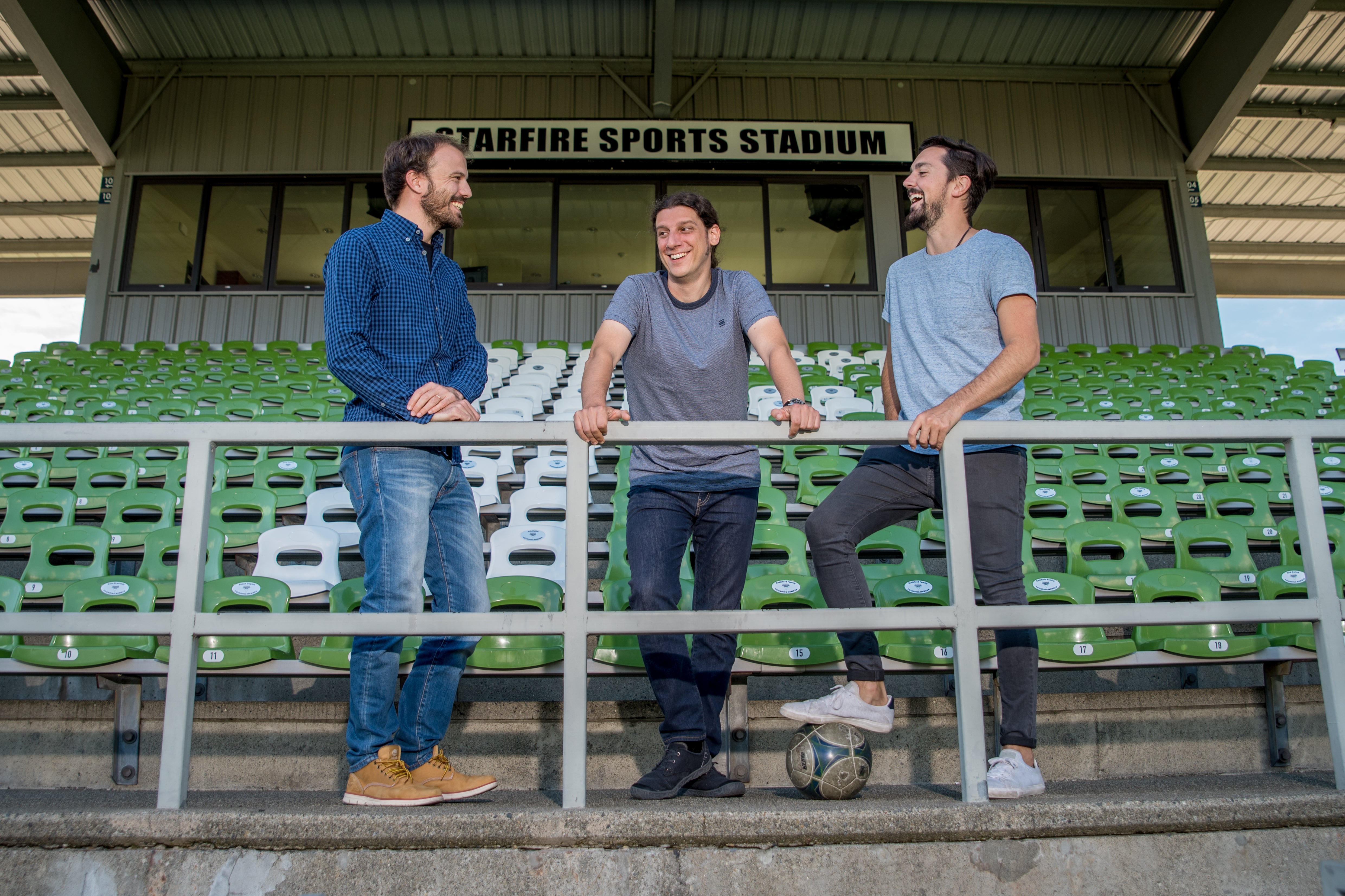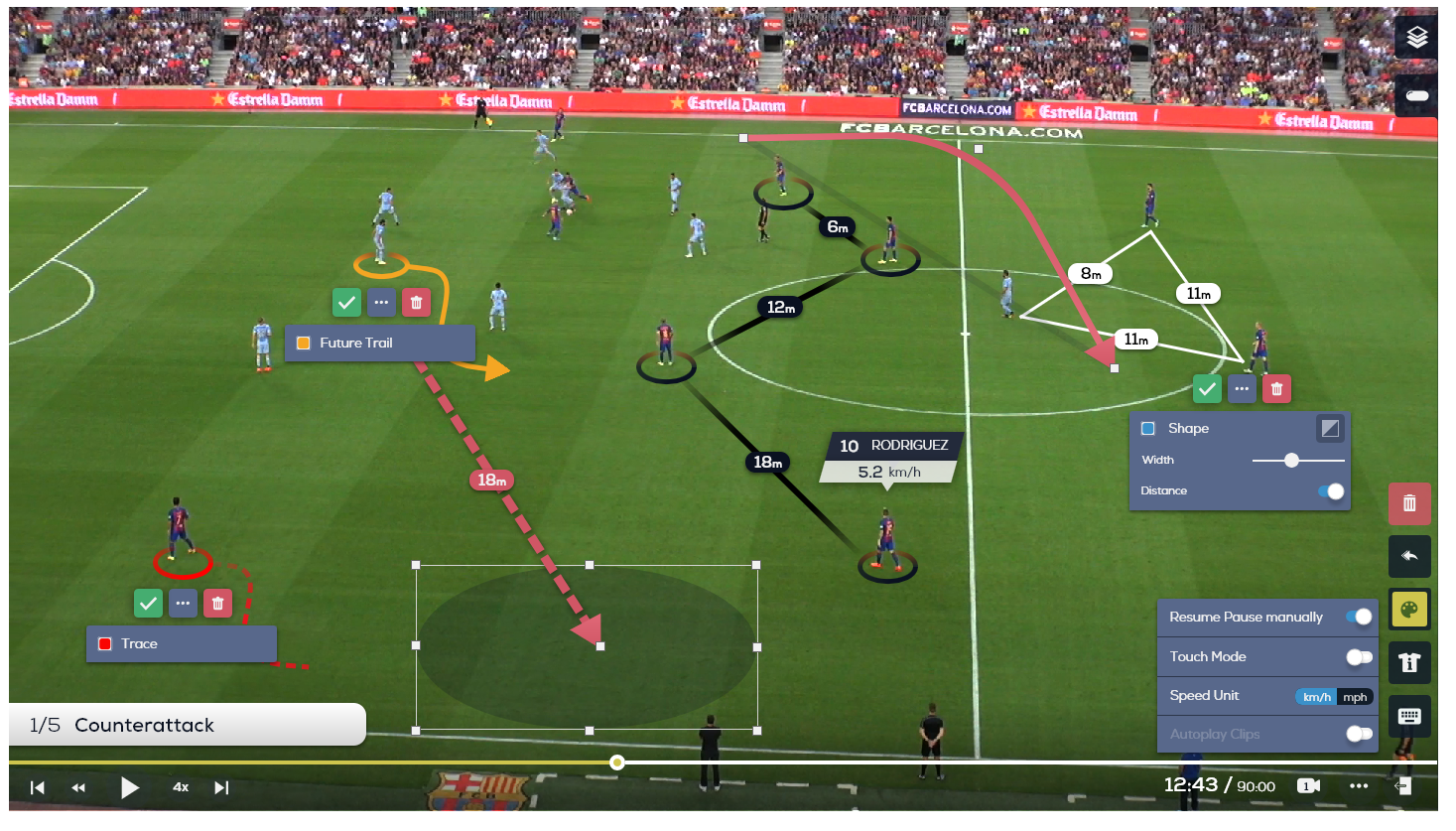Match of the data: meet the tech company changing football analysis
Ruben Saavedra grew up worshipping Barcelona. Now the CEO of Metrica Sports provide the Spanish giants – and dozens of other clubs at all levels – with the tools to improve their performance. And it all started with tracking the behaviour of rats, he tells Andy Martin


Who among us has not sat in a pub thinking, I’m sick of my job and I’d rather concentrate on watching the fabulous FC Barcelona playing on the screen? Few, I imagine. But how many of us have watched a game, knocked back a beer and then come up with a genius idea which Barcelona (and many other elite teams) would want a piece of? Only one springs to my mind: Ruben Saavedra, co-founder and CEO of Metrica Sports, which applies scientific data analysis to the understanding of football.
Saavedra was born in Barcelona and might have played for them except for two reasons: firstly he was no good at football; and secondly he preferred to play basketball (the second sport in Spain). But he first went to the Camp Nou at the tender age of seven and signed up as a club member – a lifelong committed fan. This was in 1988, even before they had won their first Champions League final (not till 1992). And he is fanatic enough to remember in what minute the goal was scored that clinched the title. “You can change your car,” he says. “You can change your wife. But you can’t change your team.”
When he realised he was not that good at basketball either, Saavedra buckled down to his studies and ended up taking biotechnical engineering and medicine at the Universitat Autonoma de Barcelona. He was bilingual in Spanish and Catalan, but decided to come to London to improve his command of English. He realised he still had a long way to go in terms of pronunciation when he walked into a pub and ordered a beer and the barman couldn’t understand a word. “I thought, I’m in a pub – what else could I want?” He honed his linguistic skills in Beckenham and Slough, working for a couple of pharmaceutical companies, then took off to Holland to do a PhD at the Vrije Universiteit in Amsterdam.
Read More:
About the first thing he did when he arrived in Amsterdam was set up the Dutch branch of the Barcelona fan club. Alongside his obsession Saavedra was doing research on neuroscience and specifically spinal chord regeneration. Most neuroscientists are very much focused on neuroscience, but he found one kindred spirit who was as football mad as he was. Bruno Dagnino was from Argentina and they bonded over Lionel Messi (Argentine but playing for Barcelona). Dagnino is probably the only neuroscientist who ever put a photo of Maradona (also Argentine) on the front cover of his doctoral thesis (yes – it was the infamous “Hand of God” goal against England – nominally because the subject was “attention” and therefore also distraction, and by extension, deception).
One other thing they had in common: rats. They both used rats in their research. It may surprise some people, but rats and humans have a lot in common, particularly at the level of DNA and molecular mechanisms. So both Saavedra and Dagnino spent a lot of their time “tracking” the behaviour of rats, how they moved, their decision-making, and even their eye movements, filming them and then forensically analysing the data. All of which explains how they came to meet up with Enzo Angilletta, a video producer in Amsterdam, and another Argentine, while watching a World Cup game on television.
Saavedra discovered that clubs were taking hours to painstakingly piece together a series of moments in any match to provide technical insights
One evening in 2014 all three of them were gathered together in a bar on the university campus, The Criterion. And of course they mainly talked about football rather than neuroscience and the behaviour of rats. They had watched a lot of video analysis of games on television and they all agreed how crude it was in comparison with what they could do at the lab. Ruben Saavedra asked, “So how are clubs analysing video?”
He was then in the last year of his PhD but he never finished his thesis (or let’s say, it remains unfinished). Neuroscience’s loss is football’s gain. The three fans – blessed with a very particular set of skills – realised that they could do better in the realm of tracking data. There was no practical difference between keeping tabs on the behaviour of rats in the lab and the movements of footballers on the field of play. “We knew we were at the beginning of a revolution,” says Saavedra. “The clubs were just starting. We thought it would be the new big thing.”
Saavedra discovered that clubs were taking hours to painstakingly piece together a series of moments in any match to provide technical insights. “But we knew we could automate the process.” Working through friends of friends, they took a “proof of concept” to the assistant coach of a Dutch club, Vitesse. They filmed a match using three Go-Pro cameras, then showed him how you could follow patterns of play – all the moments in the game in which, for example, the centre back and the right back are more than twelve metres apart from one another (which, in theory, if you want a tight defensive formation, they shouldn’t be). The coach was convinced and wanted in. But then he was sacked.
The Saavedra/Dagnino/Angilletta trio persevered. They tweeted the Argentine coach of a La Liga team, Villareal. He invited them to give a presentation. Then he called in the director of football, who exclaimed, “Esto es la bomba!” (This is the business!) They were in. They went back to Amsterdam, found themselves an investor, hired a developer, and Metrica Sports was born.

In 2015 Barcelona happened to be in Amsterdam to play Ajax. As president of the Dutch fan club, nothing was more natural than for Saavedra to invite the senior management to dinner. Or to hit them with a pitch about Metrica. “It was totally surreal,” he says. “I couldn’t even have dreamed of it.” Barcelona, the team he had been loyally following since the age of seven, were the second team to buy the latest edition of their product.
After that word got around. Big clubs were queuing up to get some of the Metrica magic. They couldn’t afford to let the others get an edge. Paris Saint-Germain followed Barcelona. Soon the American MLS signed up and the national teams of Spain and Portugal. Now data science departments are integral to all the senior clubs, just as much as coaches or physios. “We are living through exactly what we thought would happen back in 2014,” says Saavedra. People with PhDs bestride the sacred turf or at least the backrooms of stadiums, analysing everything that the guys in shorts get up to, the running, the passing, shots on goal. “It’s not crazy. All big companies want to get maximum information. Clubs are huge companies, so why would they not?”
The Metrica “elite offering” will set you back £100,000 or so (still a drop in the ocean of big club finances), but they have come up with a more accessible, less expensive (£1.5k) version – their “individual plan” – for lower league clubs. You don’t have to be Barcelona: Peterborough United (in the third tier of English football) have recently gone Metrica. “The revolution is real,” says Saavedra, “and it’s going even further than we thought.”
Read More:
He says that every game is being recorded now, at the amateur level, even by kids playing on the street. And players face the same problems the professionals faced five years ago when it comes to analysing the clips. So Metrica have made a free app, the “basic plan”, you can download to your phone. “Football is the sport of the world – why shouldn’t friends playing in the park have access to the same tools as the international stars they idolise?”
Ruben Saavedra says that “it is very fulfilling” to be able to come up with a version of their software that is useful and affordable for every club. But still his footballing high point finally came when he got to participate in the World Cup – the amateur World Cup in Amsterdam – posing as an Argentine (“I can do the accent”). Maybe he wasn’t actually playing, and was only assistant coach, but I bet he was the Messi of data analysis.
Join our commenting forum
Join thought-provoking conversations, follow other Independent readers and see their replies
Comments